No.03-D1711月3日(水・祝)17:00~19:00
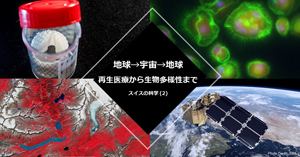
チューリッヒ大学の専門家が、地球のみならず宇宙で実施されているさまざまな研究を紹介します。
第1部では、京都大学の山中伸弥教授で有名なiPS細胞を用いた、脳の再生や心臓血管の組織工学など、生物医学のための幹細胞研究を紹介します。
第2部では、地球上での人間の健康を対象とした微小重力環境での研究を紹介します。1)慢性腰痛の治療法の改善を目指す放物線飛行での脊椎の健康に関する実験、2)宇宙での人間の免疫システムの欠損を理解するための放物線飛行での細胞生物学的実験、3)医薬品開発に使用されるヒトのミニ組織の製造試験。
第3部では、宇宙や地上からのリモートセンシング技術を用いた地球観測によって、生物多様性の物理的な変化だけでなく、人間が地球にもたらす影響も分かることを学びます。
Experts from the University of Zurich will introduce different research on Earth and from space.
We will start with stem cell research for biomedicine, in particular for brain regeneration and cardiovascular tissue engineering using induced pluripotent stem cells (iPSCs) well known in Japan thanks to Kyoto University’s Prof. Shinya Yamanaka.
Part 2 will introduce research in microgravity for human health on Earth: 1) Experiments on spinal health on board parabolic flights, aiming to improve the treatment of chronic back pain, 2) Cell biological experiments on parabolic flights to understand the deficiency of the human immune system in Space and 3) Production-tests of human mini-tissues that should be used for drug development.
In part 3, we will learn how Earth observations from space and on ground using remote sensing technologies can show us not only physical changes in biodiversity but also the impact that humans bring to our planet.
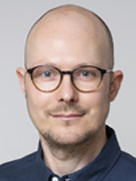
クリスチャン・タッケンベルグは、チューリッヒ大学再生医療研究所(IREM)の幹細胞研究の科学部門長。また、チューリッヒ神経科学センターのグループリーダーであり、理学部の講師でもある。研究テーマは、アルツハイマー病の病態解明のための(幹細胞を用いた)細胞モデルの応用と、脳卒中などの脳疾患に対する幹細胞を用いた再生治療法の確立。
Christian Tackenberg is the Scientific Head of Stem Cell Research at the Institute for Regenerative Medicine (IREM), University of Zurich. Further, he is a group leader at the Neuroscience Center Zurich and a lecturer for the Faculty of Science. His research focus is the application of cellular (stem cell-derived) models to uncover pathomechanisms of Alzheimer’s disease and the establishment of stem cell-based regenerative therapies for brain diseases such as stroke.
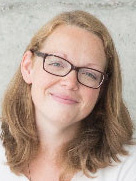
メラニー・ジェネラーリは、チューリッヒ大学の再生医療研究所(IREM)で博士号を取得。博士研究では血液細胞をiPS細胞にリプログラミングし、その後、組織工学に使用するための、平滑筋細胞や内皮細胞への分化をテーマとした。
現在は、iPS細胞コア施設の責任者として、iPS細胞由来の心筋細胞を用いて虚血性心組織を再生する京都大学iPS細胞研究所 CiRAとの共同プロジェクトに取り組んでいる。
Melanie Generali did her PhD at the Institute for Regenerative Medicine (IREM) of the University of Zurich. Her project involved the reprogramming of blood cells into induced pluripotent stem cells (iPSCs), followed by the differentiation into smooth muscle cells and endothelial cells with the goal to use them for tissue engineering.
Currently, she is the “Head of iPSC Core Facility” and works on a collaborative project with CiRA to regenerate ischemic heart tissue using iPSC-derived cardiomyocytes.
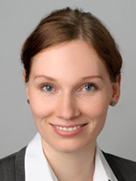
スヴァンティエ・タウバーは、2012年にスイスのチューリッヒ大学で生物学の博士号を取得。オリバー・ウルリッヒ教授のグループで15年間、重力生物学の分野で研究を行っている。2018年にチューリッヒ大学の戦略的イノベーションクラスターであるUZHスペースハブが設立されて以来、運営チームの一員としてまた宇宙生命科学実験の専門家として、参画している。
Svantje Tauber finished her PhD in biology at the University of Zurich in Switzerland in 2012. She is an active researcher in the field of gravitational biology in the group of Prof. Oliver Ullrich for 15 years. Since the UZH Space Hub, a strategic innovation cluster of the University of Zurich, was founded in 2018, she is part of the operational team and expert for Space Life Science Experiments at the UZH Space Hub.
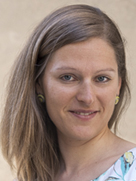
クラウディア・レーエスリは、チューリッヒ大学のリモートセンシング研究所のグループリーダー。また、スイス国の衛星データに関する窓口であるNPOCの責任者でもあり、衛星データを誰もが利用できるようにするための科学普及活動やサイエンスコミュニケーションにも積極的に取り組んでいる。
地理情報工学と都市計画で修士号、雪氷学と地震学で博士号を取得しており、現在の主な研究分野は、衛星データを用いた生物多様性の評価とモニタリングである。
Claudia Röösli is a group leader at the Remote Sensing Laboratories of the University of Zurich. She is also the head of the national point of contact for satellite data NPOC and active in science outreach and science communication to foster the use of satellite data for everyone. She holds a Master degree in Geomatic Engineering and Planning and a PhD in Glaciology and Seismology, with her current main research field in assessing and monitoring biodiversity with satellite data.
| 17:00 |
開演・挨拶 Opening |
|---|---|
| 17:05 |
登壇者:クリスチャン・タッケンベルグ タイトル:iPS細胞を用いた脳の再生 Speaker:Christian Tackenberg Title:Induced Pluripotent Stem Cells (iPSCs) for Brain Regeneration |
| 17:25 |
登壇者:メラニー・ジェネラーリ タイトル:傷ついた心臓を癒す Speaker:Melanie Generali Title:“Mending Broken Hearts” |
| 17:50 |
登壇者:スヴァンティエ・タウバー タイトル:宇宙から学ぶ人間の健康 Speaker:Svantje Tauber Title:Learning from Space for Human Health |
| 18:10 |
登壇者:クラウディア・レーエスリ タイトル:宇宙から見た生物多様性 – 何が見えるのか? Speaker:Claudia Röösli Title:Biodiversity from Space – What Can You See? |
| 18:30 |
登壇者との対話 Dialogue Between Speakers and Participants *本プログラムは英語で実施され、日本語の同時通訳がつきます。 |
iPS細胞を使って、脳細胞、心臓弁、皮膚など、あらゆる種類の細胞を作り出す再生医療の分野は、急速に進歩し、前臨床試験がすでに実施されています。臓器工学を最適化し、人間の健康に関するより多くの情報を得るために、さまざまなアプローチが試され、宇宙の低重力空間を利用した実験も行われています。さらに、地上で行われる低重力研究や、宇宙からの地球観測で生物多様性や気候についての情報を得て、データをもとに持続可能性や、マラリアなどの伝染病の予測に役立てる研究もあります。
様々な技術とアプローチでどのように人間の健康と自然や生物多様性をモニターし守ることが出来るか。
iPS細胞、脳の再生、心臓血管、組織工学、生物医学、微小重力環境、放物線飛行、宇宙、生物多様性
03-A13 脳科学とテクノロジーの融合 脳と機械をつないだら?
03-E15 信頼のおける医療情報:コクラン系統的レビュー
03-E17 人とAIとの共生:日本型AIにおける人間中心とは?
04-A13 健康ビッグデータと最新科学がもたらす健康長寿社会
05-A15 持続可能な社会に向けたディープ・テックにおける協働と投資
05-B17 ERATOセッション 私たちの未来を変える情報技術
06-B17 ここまできた!核融合エネルギー実現への道~イーター建設の現場から~
06-D10 生命の根幹を探る~クロマチンアトラスを描く~
06-F00 IVRC2021(Interverse Virtual Reality Challenge)
07-D13 シン・サイエンス~情報・AI・ビッグデータが紡ぐ最先端研究~
10-A17 リアルとネットを繋ごう ~体験価値のデジタル化~
11-A13 考古学✕情報工学 コクゾウムシを見つけたい!
11-A17 「ディープフェイク:人間の脳を欺くハイテク・イリュージョン」日本とスイスの専門家に聞くースイスの科学(1))